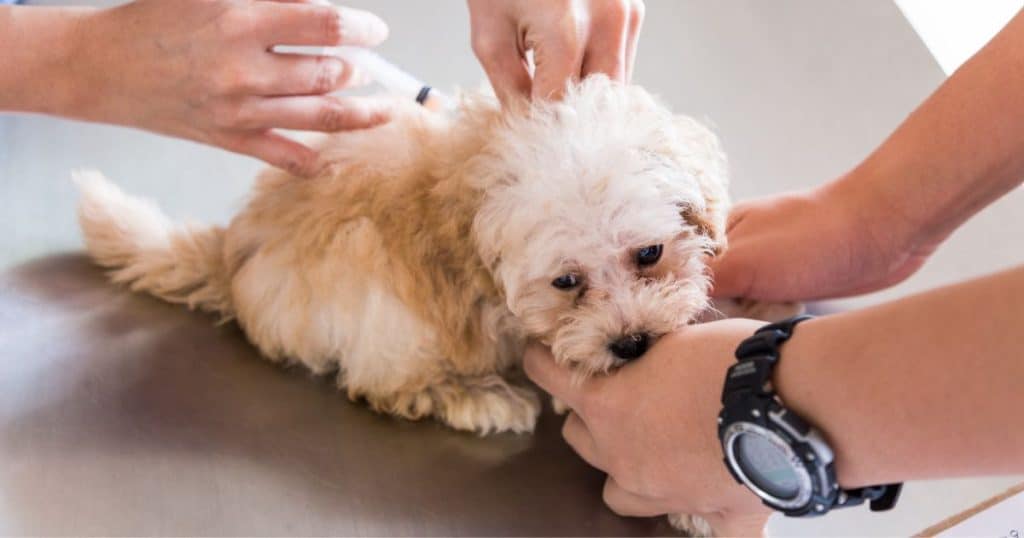What to Know
Poodle Health Issues: What You Need to Know

As a Poodle owner, it’s essential to understand the potential health issues that your furry friend may face. Poodles are generally healthy dogs, but like any other breed, they are prone to specific health problems. Being aware of these issues can help you take preventative measures and seek prompt medical attention if necessary.
Common Health Issues in Poodles
Some of the most common health issues in Poodles include bloat, hip dysplasia, Addison’s disease, hypothyroidism, epilepsy, and progressive retinal atrophy. These conditions can cause severe discomfort and even be life-threatening if left untreated. It’s essential to stay vigilant and watch out for any symptoms that may indicate a health problem.
Symptoms and Diagnosis of Poodle Health Issues
Symptoms of Poodle health issues can vary depending on the condition. Some common signs to look out for include vomiting, diarrhea, lethargy, loss of appetite, difficulty walking, and excessive thirst or urination. If you notice any of these symptoms in your Poodle, it’s crucial to seek veterinary care immediately. Your vet can perform diagnostic tests, such as blood work, x-rays, and ultrasounds, to determine the underlying cause of your dog’s symptoms.
Key Takeaways
- Poodles are prone to specific health problems, including bloat, hip dysplasia, Addison’s disease, hypothyroidism, epilepsy, and progressive retinal atrophy.
- Symptoms of Poodle health issues can include vomiting, diarrhea, lethargy, loss of appetite, difficulty walking, and excessive thirst or urination.
- Prompt veterinary care is essential if you notice any of these symptoms in your Poodle.
Poodle Breeds and Their Health Concerns

Poodles are a popular breed of dogs known for their intelligence, elegance, and hypoallergenic fur. They come in three varieties: Standard, Miniature, and Toy. Each variety has its unique characteristics, but they all share some common health concerns.
Standard Poodle Health Issues
Standard Poodles are the largest of the three varieties, with a lifespan of 10-12 years. They are prone to some health issues, including:
- Gastric Dilatation-Volvulus (GDV), commonly known as bloat, is a life-threatening condition that can occur when the stomach twists.
- Hip Dysplasia is a condition where the hip joint doesn’t develop properly, leading to arthritis and pain.
- Progressive Retinal Atrophy (PRA), is a genetic eye disorder that leads to blindness.
- Addison’s Disease is a hormonal disorder that affects the adrenal glands, leading to fatigue, vomiting, and diarrhea.
Toy Poodle Health Issues
Toy Poodles are the smallest of the three varieties, with a lifespan of 12-15 years. They are generally healthy, but they are still prone to some health issues, including:
- Patellar Luxation, is a condition where the kneecap dislocates from its normal position, leading to limping and pain.
- Dental Problems, such as tooth decay and gum disease, can lead to bad breath, tooth loss, and infections.
- Hypoglycemia is a condition where the blood sugar level drops below normal, leading to weakness, seizures, and even death.
Miniature Poodle Health Issues
Miniature Poodles are a medium-sized variety, with a lifespan of 12-15 years. They are prone to some health issues, including:
- Epilepsy is a neurological disorder that leads to seizures.
- Legg-Calve-Perthes Disease is a condition where the hip joint deteriorates, leading to pain and limping.
- Cushing’s Disease, is a hormonal disorder that affects the adrenal glands, leading to increased thirst and urination, weight gain, and hair loss.
In conclusion, Poodles are generally healthy dogs, but they are prone to some health issues that owners should be aware of. Regular check-ups with a veterinarian, proper nutrition, and exercise can help prevent and manage these health concerns.
Common Health Issues in Poodles

Poodles are generally considered a healthy breed, but like any other breed, they are prone to certain health issues. Here are some of the most common health issues in Poodles:
Genetic Disorders
Poodles are prone to several genetic disorders, such as hip dysplasia, which is a condition where the hip joint does not develop properly and can cause mobility issues. Another genetic disorder is progressive retinal atrophy, which is a degenerative eye disease that can lead to blindness. Other genetic disorders include Addison’s disease, hypothyroidism, and epilepsy.
Digestive Problems
Poodles are also prone to digestive problems such as bloat, which is a life-threatening condition that occurs when the stomach twists on itself, trapping gas and food. Symptoms of bloat include restlessness, a distended abdomen, and vomiting. Other digestive problems include pancreatitis, which is an inflammation of the pancreas, and food allergies or intolerances.
Eye and Ear Conditions
Poodles are prone to several eye and ear conditions, such as cataracts, which is a clouding of the eye’s lens that can lead to blindness. Other eye conditions include entropion, which is a condition where the eyelid rolls inward, causing the eyelashes to rub against the eye. Ear infections are also common in Poodles, especially those with long ears.
Musculoskeletal Issues
Poodles are also prone to musculoskeletal issues such as patellar luxation, which is a condition where the kneecap dislocates from its normal position. Symptoms of patellar luxation include limping and a reluctance to put weight on the affected leg. Another musculoskeletal issue is intervertebral disc disease, which is a condition where the discs between the vertebrae in the spine degenerate and can cause pain and paralysis.
Endocrine Disorders
Poodles are prone to several endocrine disorders, such as hypothyroidism, which is a condition where the thyroid gland does not produce enough thyroid hormone. Symptoms of hypothyroidism include weight gain, lethargy, and hair loss. Another endocrine disorder is Cushing’s disease, which is a condition where the adrenal glands produce too much cortisol. Symptoms of Cushing’s disease include increased thirst and urination, hair loss, and a pot-bellied appearance.
If you suspect that your Poodle may be suffering from any of these health issues, it’s important to take them to a veterinarian for diagnosis and treatment. Treatment may include medications, surgery, or a combination of both. Regular check-ups and preventative care can also help keep your Poodle healthy and happy for years to come.
Symptoms and Diagnosis of Poodle Health Issues

If you’re a Poodle owner, you should be aware of the common health issues that can affect your pet. Recognizing the symptoms and getting a proper diagnosis is crucial to ensure that your dog gets the best possible care. In this section, we’ll discuss the symptoms of Poodle health issues and the diagnosis process.
Recognizing Symptoms
Poodles can suffer from a variety of health issues, including limping, blindness, vomiting, diarrhea, lethargy, excessive drooling, weakness, stiffness, pacing, and distress. Some of the most common symptoms of Poodle health issues include:
- Limping: If your Poodle is limping, it could be a sign of joint problems, such as hip dysplasia or arthritis.
- Blindness: Poodles are prone to developing cataracts, which can lead to blindness.
- Vomiting and diarrhea: These symptoms can be caused by a variety of health issues, including gastrointestinal problems and infections.
- Lethargy: If your Poodle seems tired and lacks energy, it could be a sign of an underlying health issue.
- Excessive drooling: This can be a sign of dental problems or other health issues.
- Weakness and stiffness: These symptoms can be caused by joint problems or other health issues.
- Pacing and distress: If your Poodle is restless and seems distressed, it could be a sign of pain or anxiety.
Diagnosis Process
If you notice any of these symptoms in your Poodle, it’s important to take them to the vet for a proper diagnosis. The vet will perform a physical exam and may order diagnostic tests, such as blood work, X-rays, or ultrasounds.
Once a diagnosis has been made, the vet will work with you to develop a treatment plan for your Poodle. This may include medication, surgery, or other types of therapy, depending on the specific health issue.
In conclusion, recognizing the symptoms of Poodle health issues and getting a proper diagnosis is crucial to ensure that your pet gets the best possible care. If you notice any of the symptoms discussed in this section, don’t hesitate to take your Poodle to the vet. With proper care and treatment, your Poodle can live a happy and healthy life.
Treatment and Management of Poodle Health Issues

Poodles are prone to a variety of health issues that require proper treatment and management. Here are some ways to address these issues:
Medical Interventions
When it comes to treating Poodle health issues, medical interventions are often necessary. For instance, if your Poodle suffers from hip dysplasia, your veterinarian may recommend surgery or medication to alleviate pain and improve mobility. Similarly, if your Poodle has Addison’s disease, medication can help regulate hormone levels and manage symptoms.
It’s important to follow your veterinarian’s advice when it comes to medical interventions. This may include administering medication, scheduling follow-up appointments, or adhering to a specific treatment plan. Your veterinarian can also provide guidance on how to monitor your Poodle’s progress and adjust treatment as needed.
Lifestyle Adjustments
In addition to medical interventions, lifestyle adjustments can also play a crucial role in managing Poodle health issues. For example, if your Poodle is overweight, adjusting their diet and exercise routine can help them shed pounds and improve overall health. Similarly, if your Poodle is prone to stress, providing a calm and comfortable environment can help reduce anxiety and prevent related health issues.
When making lifestyle adjustments, it’s important to take a holistic approach. This may involve working with a veterinarian or animal behaviorist to identify specific triggers and develop a comprehensive plan for addressing them. It may also involve making changes to your Poodle’s daily routine, such as incorporating more exercise or adjusting feeding times.
Overall, treating and managing Poodle health issues requires a combination of medical interventions and lifestyle adjustments. By working closely with your veterinarian and making necessary changes to your Poodle’s routine, you can help ensure that they lead a happy and healthy life.
Prevention and Care for Poodle Health

As a responsible Poodle owner, it is essential to ensure that your furry friend stays healthy and happy. Proper prevention and care are the keys to maintaining your Poodle’s well-being. Here are some tips to help you keep your Poodle healthy.
Regular Vet Check-ups
Regular visits to the vet are crucial to maintaining your Poodle’s health. Your vet will check your Poodle’s weight, teeth, ears, and eyes and will also perform routine blood tests to check for any underlying health issues. It is essential to schedule annual check-ups, as well as any necessary follow-up appointments, to ensure that your Poodle remains in good health.
Proper Nutrition and Exercise
Proper nutrition and exercise are essential to keep your Poodle healthy. A balanced diet that is rich in protein, vitamins, and minerals is crucial to maintaining your Poodle’s health. You should also ensure that your Poodle gets enough exercise to maintain a healthy weight. Obesity can lead to several health issues, including joint problems, heart disease, and diabetes.
Grooming and Hygiene
Regular grooming and hygiene are essential to maintaining your Poodle’s health. Poodles have a unique coat that requires regular grooming to prevent matting and tangling. You should also ensure that your Poodle’s ears are clean and dry to prevent infections. Additionally, you should regularly trim your Poodle’s nails to prevent them from becoming too long, which can cause discomfort and lead to joint problems.
In conclusion, prevention and care are the keys to maintaining your Poodle’s health. Regular vet check-ups, proper nutrition and exercise, and grooming and hygiene are essential to keeping your Poodle healthy and happy. By following these tips, you can ensure that your Poodle remains in good health for years to come.
Living with a Poodle: Understanding Their Needs

As an intelligent and loving breed, Poodles make excellent companions for families with children or individuals seeking a loyal and affectionate pet. However, to ensure a happy and healthy life for your Poodle, it’s important to understand their specific needs and provide them with the proper care and attention.
Mental Stimulation and Training
Poodles are highly intelligent dogs that require mental stimulation and regular training to keep them happy and well-behaved. Without proper mental stimulation, Poodles can become bored and destructive, leading to unwanted behaviors such as chewing, digging, and excessive barking.
To keep your Poodle mentally stimulated, consider providing them with interactive toys, puzzle games, and training exercises. These activities will challenge their minds and provide them with the mental stimulation they need to stay happy and healthy. Additionally, regular training sessions will help your Poodle learn new commands, improve their behavior, and strengthen the bond between you and your pet.
Socialization and Temperament
Poodles are known for their friendly and outgoing personalities, making them great pets for families with children or other pets. However, it’s important to socialize your Poodle from a young age to ensure they develop good social skills and temperament.
Socialization involves exposing your Poodle to a variety of people, animals, and environments to help them feel comfortable and confident in different situations. This can include taking your Poodle to the park, introducing them to new people and pets, and exposing them to different sights and sounds.
By providing your Poodle with proper mental stimulation and socialization, you can ensure they live a happy and healthy life. Remember to always provide your Poodle with plenty of love, attention, and care to help them thrive as a member of your family.
Before You Go
In conclusion, Poodles are an amazing breed of dog that make great companions. However, they are prone to certain health issues that owners should be aware of. Some of the most common Poodle health issues include bloat, Addison’s disease, hip dysplasia, thyroid issues, progressive retinal atrophy, luxating patella, epilepsy, and hypoglycemia in puppies.
It is important for Poodle owners to be vigilant and proactive about their dog’s health. Regular check-ups with a veterinarian and screenings for genetic health issues recommended by the Poodle Club of America can help catch potential health issues early on.
In addition to regular check-ups, proper nutrition and exercise can also help prevent some health issues. Poodles are an active breed that require daily exercise to maintain their physical and mental health. A balanced diet that is appropriate for their age and size can also help prevent obesity, which can lead to a host of health issues.
Overall, owning a Poodle can be a rewarding and fulfilling experience. With proper care and attention, Poodles can live long and healthy lives. By staying informed about common Poodle health issues and taking preventative measures, owners can help ensure their furry friends stay happy and healthy for years to come.
FAQs
What problems are Poodles prone to?
Poodles are prone to various health problems, such as hip dysplasia, bloat, Addison’s disease, hypothyroidism, progressive retinal atrophy, epilepsy, and hypoglycemia. These health issues can affect Poodles of any size, from toy to standard. It is essential to be aware of these health concerns and take preventive measures to ensure your Poodle’s well-being.
What is the leading cause of death in Poodles?
The leading cause of death in Poodles is cancer, specifically hemangiosarcoma, which is a malignant tumor of blood vessels. Other common causes of death in Poodles include old age, kidney failure, and heart disease. Regular veterinary check-ups and preventive care can help detect and manage these illnesses.
What is the life expectancy of a Poodle?
The life expectancy of a Poodle varies depending on the size of the dog. Toy Poodles can live up to 18 years, Miniature Poodles up to 15 years, and Standard Poodles up to 12 years. Proper nutrition, exercise, and regular veterinary check-ups can help extend your Poodle’s lifespan.
What are some common genetic diseases in Poodles?
Some common genetic diseases in Poodles include hip dysplasia, progressive retinal atrophy, von Willebrand’s disease, and sebaceous adenitis. These diseases can be inherited from the parents and can affect the Poodle’s quality of life. It is essential to work with a reputable breeder who screens their dogs for these health issues.
What are the symptoms of hip dysplasia in Poodles?
Hip dysplasia is a common health issue in Poodles, which can cause pain and discomfort. Symptoms of hip dysplasia in Poodles include limping, difficulty standing up or lying down, reluctance to exercise, and decreased range of motion. Early detection and treatment can help manage the symptoms and improve the Poodle’s quality of life.
What are some common health issues in Moyen Poodles?
Moyen Poodles, also known as Klein Poodles, are a medium-sized variety of Poodles. They are prone to the same health issues as other Poodles, such as hip dysplasia, bloat, and Addison’s disease. It is essential to provide proper nutrition and exercise, as well as regular veterinary check-ups, to ensure the Moyen Poodle’s well-being.

